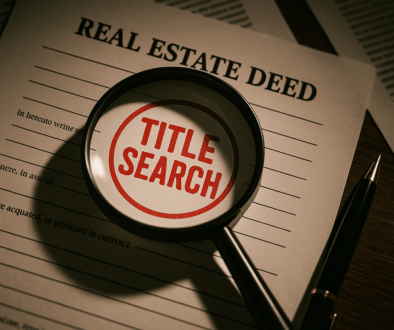Don’t sign until you’ve checked these 5 title red flags
When reviewing a property’s title in British Columbia, it’s easy to skim past the list of charges and assume it’s all standard. But not all title issues are harmless — and not all of them are obvious unless you know what you’re looking for. Whether you’re buying your first condo, selling a long-held family home, or representing a client in either role, understanding what shows up on title could save you from delays, legal disputes, or serious restrictions down the road.
Let’s break down five common title concerns you might come across — and why they matter.
Builder’s Liens
A builder’s lien is filed when a contractor, subcontractor, or supplier claims they weren’t paid for work or materials provided on the property. Even if the work was done months ago, the lien can still be registered after you go under contract. The problem? You can’t transfer a clean title until that lien is resolved.
If you’re a buyer, it means the seller must settle that debt before closing. If you’re a seller, it’s best to run a title search early to catch this — especially if any recent renovations were done. It’s not uncommon to find a lien filed by someone two or three layers removed from the main contractor.
Court Judgments
Sometimes people have personal legal issues that spill into their property. A court judgment can be registered on title when a creditor sues the homeowner and wins. This becomes a charge against the property — essentially a claim on the asset.
Buyers should be cautious here. A judgment must be discharged before you take ownership. Sellers might not even realize it’s on title, especially if it’s from years ago. But it can derail your sale unless it’s addressed promptly.
Rights-of-Way or Easements That Weren’t Disclosed
An easement or right-of-way gives someone else legal access to part of your property — like BC Hydro needing to access underground lines or a shared driveway between neighbors. Sometimes these are known and expected. But other times, they’re buried in the fine print and weren’t disclosed in the listing.
This matters because easements can limit your use of the property. You may not be able to build a fence, plant trees, or even put up a shed in certain areas. Always have these reviewed during your title search and understand exactly who has access — and where.
Restrictive Covenants
Restrictive covenants are legal promises that limit what you can do with your land. These can be historical — like a 50-year-old rule saying you can’t build higher than two stories — or more recent ones put in by developers to control aesthetics or density.
They can affect everything from future renovations to building a laneway house or converting to a duplex. Buyers should never assume they can “do what they want” with a property just because it’s zoned a certain way. The covenant could override it.
Leasehold Interests
Not all land in BC is freehold. Some properties — especially in areas like False Creek or parts of Vancouver West — sit on leasehold land. That means you’re buying the right to occupy the land for a fixed period, not the land itself.
Leasehold titles come with added complexities: shorter mortgage terms, restrictions on resale, and often escalating lease payments. It’s not a dealbreaker for everyone, but buyers need to go in with eyes wide open. Sellers should disclose clearly, or risk scaring off buyers late in the game.
These five issues are more than just legal jargon. They can directly affect value, financing, and how a property is used. A proper title search, reviewed by your legal professional, isn’t just paperwork. It’s peace of mind.
Always dig deeper than the surface. A beautiful home isn’t worth much if the title underneath it is a mess.





